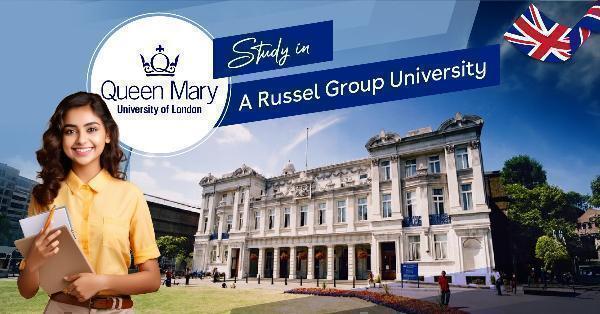Insights for Prospective Students: Applying to Queen Mary University

Strong 8k brings an ultra-HD IPTV experience to your living room and your pocket.
Queen Mary University of London (QMUL) is one of London’s most prestigious universities, ranking 120th worldwide as of 2025, according to QS. The university offers world-class education and offers various programmes across multiple disciplines. But to get into QMUL, you must follow through with the application process and, most importantly, stick to the deadlines.
In the following section, we’ll provide you with a rough overview of QMUL’s application process as well as when to start looking for your perfect Queen Mary University Accommodation.
Understanding Your Options
QMUL offers its students a wide range of programmes for undergraduate and postgraduate students. The first stage is deciding on a programme of study, followed by the application.
To understand your best options, explore your passions and interests, skills and strengths, and values. You can also think further about your intended career by looking at job market trends. There are various other ways to help understand your options, and these include the following:
Taking your counsellor’s opinion
Reach out to people in the field
Take an online test
Check the course pages
In the following section, we’ll outline in detail the application process for both undergraduate and postgraduate students. The application process may differ depending on the level of study (undergraduate or postgraduate).
Application Process
As previously mentioned, the application process differs between undergraduate and postgraduate levels, so in the following sections, we’ll explore both processes more fully.
Undergraduate Applications (August - February)
Undergraduate students submit their applications through the Universities and Colleges Admissions Service (UCAS) site. This centralised platform allows students to apply to up to five universities in the UK.
The timeline for undergraduate applications is as follows:
- August - September: This period is ideal for researching potential programmes. You can use QMUL's course finder to learn more about programme details, entry requirements, and career prospects. The site also allows you to familiarise yourself with the UCAS application process.
- October-January: By this time, you should start filling out your UCAS application and provide the following: personal details, academic qualifications, motivations and goals, and a reference by a teacher or counsellor. Keep an eye out for deadlines, as the main deadline is the 31st of January.
Postgraduate Application Process
Postgraduate applications differ from undergraduate processes in that they are done directly through QMUL’s portal and not through UCAS. Luckily for postgraduate students, the application process is less rigid than the undergraduate process and is on a rolling basis for admission. However, it is highly recommended that you submit your application as soon as possible to have a smoother application process.
Note that some programmes may have different procedures; for instance, Medicine and Dentistry have a specific application process. Transfer or Advanced Entry (students already enrolled in a programme and transferring into QMUL) also differ as they have a different application process.
Building a Strong Application: Required Documents
Now comes the fun and technical aspects of the application process, which include crafting a strong application and preparing and providing documents.
While applying, you must ensure that you build a strong application. Make sure that you have all the necessary documents, as well as ones that highlight your potential. To do that, you must have the following documents prepared:
- Academic Transcripts: Ensure that you provide official academic transcripts from your previous educational institutions; this reflects your academic standing and potential.
- English Language Proficiency Test Scores: This is a general requirement for non-native English speakers. Some of the most commonly requested courses include IELTS and TOEFL. English proficiency score requirements differ based on the programme, so check the individual page pages.
- Personal Statement: A personal statement highlights who you are and your ambitions while also highlighting your relevant skills. In short, this is your chance to shine, so include your achievements, skills, and motivations to pursue this programme.
- References: One or two references from professors, teachers, or even employers can strengthen your application.
Some programmes may request additional documents, so always watch for specific information on the QMUL website.
In order to have a noteworthy application, it is important to demonstrate a genuine interest in QMUL and your desired programme. Also, ensure that you highlight your academic achievements and any other achievements that can bolster your application. Make sure also to review and edit your application and meet deadlines.
The Next Steps: After You Apply
Once you submit your application, here’s what to expect:
- UCAS Applications: You can track your application progress through the UCAS account if you're an undergraduate student. You’ll also receive all updates through the UCAS’s platform, along with any interview invitations.
- QMUL Applications: For postgraduate applications, you’ll receive an email acknowledgement once your application is submitted.
- Receiving an offer: Receiving an offer means that your application has been successful. Undergraduates will receive an offer from UCAS, and postgraduates will receive an offer from QMUL.
- Responding to the Offer: Review the terms, conditions, and deadlines and accept the application.
- Start looking for accommodation: Once you have accepted your offer, you should start looking for options for Student Accommodation London. Note that various properties have a no place, no pay policy (which guarantees a refund in case you later get rejected) or a no visa, no pay policy (which guarantees a refund in case you later get rejected).
- If you’d also like to know more about student housing in London and need assistance finding one, you can always rely on expert companies, which help students find their perfect accommodation free of charge.
- All you have to do is search by city or campus, filter out by price, cancellation policy, and room type, and you can easily find what you’re looking for. Just don’t forget to click the enquire button by your desired option or simply contact the company’s expert staff.
- Visas: International students generally require a study visa to study in the UK, so make sure you understand the process and keep up to date with the deadlines. You’ll find more detailed information on QMUL’s guidance page for international students.
- Pre-sessional English Courses: Depending on your course requirements, you may require additional language courses before joining the programme.
So there you have it. This is a rough overview of QMUL’s application process. Remember, for more information, check with QMUL and check out individual course pages and requirements. Contacting QMUL to learn more about the application process is also important.
Note: IndiBlogHub features both user-submitted and editorial content. We do not verify third-party contributions. Read our Disclaimer and Privacy Policyfor details.


